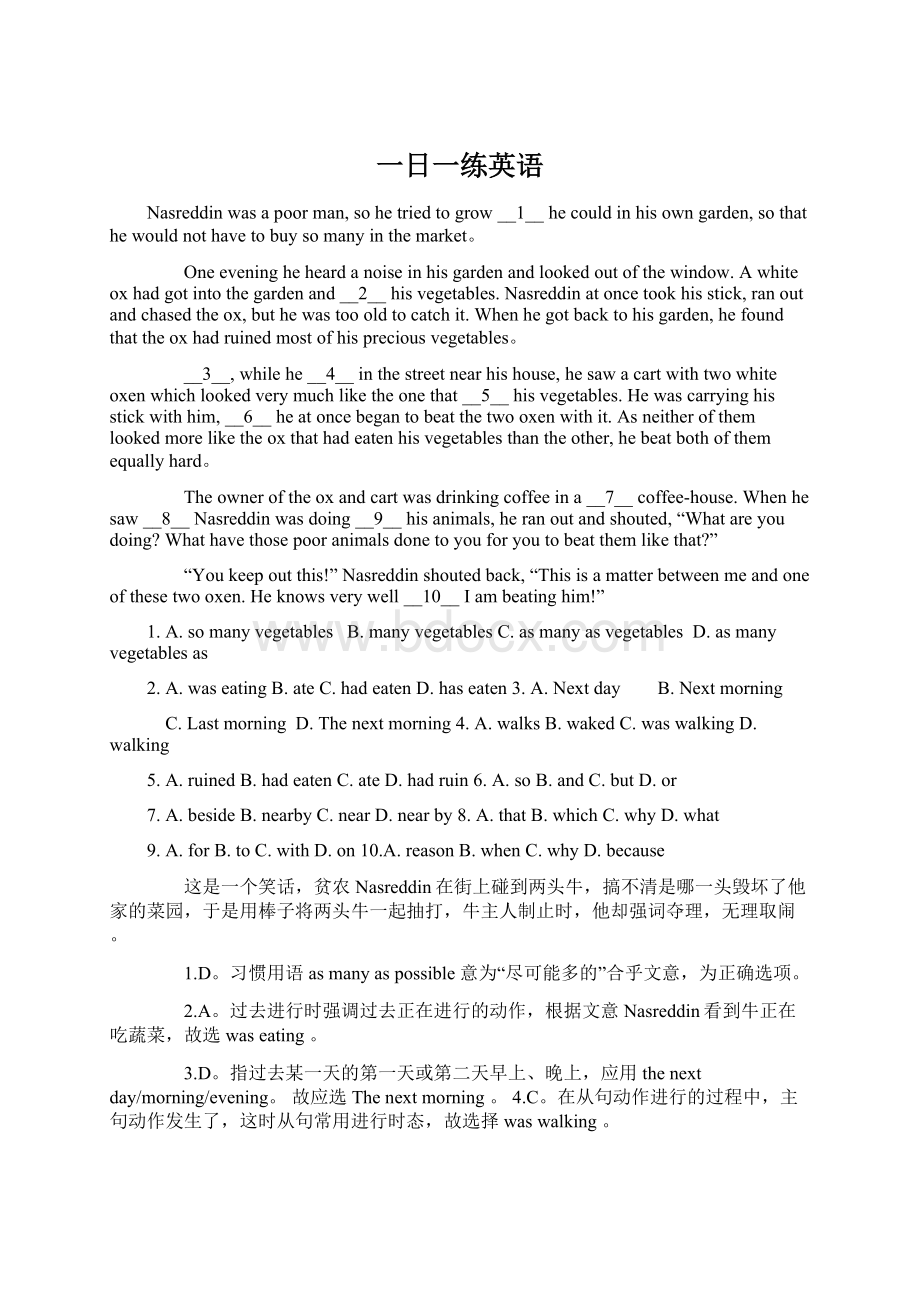一日一练英语.docx
《一日一练英语.docx》由会员分享,可在线阅读,更多相关《一日一练英语.docx(34页珍藏版)》请在冰豆网上搜索。

一日一练英语
Nasreddinwasapoorman,sohetriedtogrow__1__hecouldinhisowngarden,sothathewouldnothavetobuysomanyinthemarket。
Oneeveningheheardanoiseinhisgardenandlookedoutofthewindow.Awhiteoxhadgotintothegardenand__2__hisvegetables.Nasreddinatoncetookhisstick,ranoutandchasedtheox,buthewastoooldtocatchit.Whenhegotbacktohisgarden,hefoundthattheoxhadruinedmostofhispreciousvegetables。
__3__,whilehe__4__inthestreetnearhishouse,hesawacartwithtwowhiteoxenwhichlookedverymuchliketheonethat__5__hisvegetables.Hewascarryinghisstickwithhim,__6__heatoncebegantobeatthetwooxenwithit.Asneitherofthemlookedmoreliketheoxthathadeatenhisvegetablesthantheother,hebeatbothofthemequallyhard。
Theowneroftheoxandcartwasdrinkingcoffeeina__7__coffee-house.Whenhesaw__8__Nasreddinwasdoing__9__hisanimals,heranoutandshouted,“Whatareyoudoing?
Whathavethosepooranimalsdonetoyouforyoutobeatthemlikethat?
”
“Youkeepoutthis!
”Nasreddinshoutedback,“Thisisamatterbetweenmeandoneofthesetwooxen.Heknowsverywell__10__Iambeatinghim!
”
1.A.somanyvegetables B.manyvegetablesC.asmanyasvegetables D.asmanyvegetablesas
2.A.waseatingB.ateC.hadeatenD.haseaten3.A.Nextday B.Nextmorning
C.Lastmorning D.Thenextmorning4.A.walksB.wakedC.waswalkingD.walking
5.A.ruinedB.hadeatenC.ateD.hadruin6.A.soB.andC.butD.or
7.A.besideB.nearbyC.nearD.nearby8.A.thatB.whichC.whyD.what
9.A.forB.toC.withD.on10.A.reasonB.whenC.whyD.because
这是一个笑话,贫农Nasreddin在街上碰到两头牛,搞不清是哪一头毁坏了他家的菜园,于是用棒子将两头牛一起抽打,牛主人制止时,他却强词夺理,无理取闹。
1.D。
习惯用语asmanyaspossible意为“尽可能多的”合乎文意,为正确选项。
2.A。
过去进行时强调过去正在进行的动作,根据文意Nasreddin看到牛正在吃蔬菜,故选waseating。
3.D。
指过去某一天的第一天或第二天早上、晚上,应用thenextday/morning/evening。
故应选Thenextmorning。
4.C。
在从句动作进行的过程中,主句动作发生了,这时从句常用进行时态,故选择waswalking。
5.B。
牛吃蔬菜是贫农上街之前的事,文章本身讲的是过去的故事,指过去的过去应用过去完成时,故选hadeaten。
6.A。
从句子意思看,空白处前后构成因果关系,故选择so。
7.B。
形容词nearby一般作定语,表示“不远的,附近的”,合乎文意,为正确选项。
8.D。
这里需要一个引导词,引导saw的宾语从句,同时在句子里作do的宾语,故选what。
9.B。
dosth.tosb。
结构中to后面常接动作的对象。
10.C。
牛主人问及Nasreddin打牛的原因,这里需要一个引导词引导knew的宾语从句,且在从句中作状语,根据上文可知这里应填why。
(二)
Once,akingshowedtwomenalargebasketinthegarden.Hetoldthemtofillitwithwaterfromawell.Afterthey__1__theirwork,heleftthem,saying,“Whenthesunisdown,Iwillcomeandseeyourwork。
”
Atlastoneofthemsaid,“What’stheuseofdoingthisfoolishwork?
Wecan__2__fillthebasket。
”__3__mananswered,“Thatisnoneofyourbusiness。
”Thefirstmansaid.“Youmaydoasyoulike,butIamnotgoingtoworkat__4__sofoolish。
”He__5__hisbucketandwentaway.Theothermansaidnoword,andkeptoncarrying__6__.Atlastthewellwasalmost__7__。
Ashepouredthelastbucketofwaterintothebasket,hesawabrightthinginit.Hepickeditup.Itwasabeautifulgoldring.Justthenthekingcame.__8__hesawthering,heknewthathehadfoundthekindofmanhewanted.Hetoldhimtokeeptheringforhimself.“You__9__sowellinthislittlething,”hesaid,“__10__nowIknowIcanbelieveyouwithmanythings。
”
1.A.finishedB.didC.beganD.had2.A.everB.neverC.easilyD.no
3.A.TheotherB.AnotherC.OneD.Asecond4.A.anythingB.somethingC.nothingD.everything
5.A.pickedupB.putawayC.tookawayD.threwaway6.A.waterB.basketC.wellD.work
7.A.fullB.emptyC.filledD.clean8.A.WhileB.AssoonasC.BeforeD.Since
9.A.havedoneB.willdoC.doD.aredoing10.A.whatB.whyC.whenD.that
本文讲述了一个国王为了考验两个人,让他们往篮子里打水,忠诚的人不遗余力地往空篮子里打水,直到国王归来。
结果不仅获得了一枚金戒指,而且得到了国王的信任。
1.C。
这里did和finished都表示完成了这项工作,而给篮子装满水是不可能的,国王应在两人开始打水后不久离开,所以应选began。
2.B。
往篮子里盛满水是永远不可能的,故选择never。
3.A。
两者中的另一个用theother加名词来表示。
4.C。
thefirstman想离开,因为他觉得自己干的是无用功,故选择nothing意为“从事某项工作”。
5.D。
pickup意为“捡起”,pickaway意为“放好”,takeaway意为“取走”,而throwdown意为“扔掉、丢弃”,比较贴近文意,为正确选项。
6.A。
根据文意,另一个人一直在打水,故选water。
7.B。
不停地打水必然会导致井空,故选empty。
8.B。
while引导从句时,从句应用延续性动词,before和since不符合文意,assoonas…表示“一……就”为正确选项。
9.A。
国王是因为这个诚实的人所做过的事情而表扬他,所以应用完成时态havedone。
10.D。
国王讲的最后一句话是含有“so……that”结构的复合句,意为“如此……以致”故选that。
(三)
PubsareanimportantpartofBritishlife.Pubs,formallypublichouses,arecommonintownsandvillagesinEngland.Peopleusuallytalk,eat,drink,meettheirfriendsandrelaxthere.Youcanordersoftdrinkslikeorangejuice,colaorcoffee,butmanypeoplegotopubstohaveanalcoholicdrink.Manytypesofalcoholicdrinksareavailable,butthemostpopulardrinkisbeer.
TraditionalEnglishbeercomesinavarietyoflocalflavorsandiscalled‘draught’beer.Alldraughtbeerisservedfromahandpumponthebarratherthaninbottlesorcans.UnlikeAmericanorotherEuropeanbeers,itisservedcoolbutnotcold.Nowadays,alotofEnglishpeopleenjoyaEuropeanbeerscalledlager(淡味啤酒).Thisislighter,morerefreshing(清新的)andisservedcold.Beerissoldinpintorhalf-pintglasses(apintisjustoverhalfalitre).Whenyouorderadrink,askfora‘pint’ora‘half’ofthebeeryouwanttotry.
ThereisnowaiterserviceinanEnglishpub.Yougotothebarandplaceyourordertothepubstaff.Theywillpouryourdrinksandpassthemtoyou.Theywillthentellyouhowmuchtopay.Youhavetopayyourdrinksthereandthen.Afterreceivingyourchange,youcancarryyourdrinksbacktoatabletoenjoy.Itisusualforfriendstotaketurnsbuyingdrinksforeachother.Thisisknownas’buyingaround’.
Pubssellcheapfoodtoo.Thechoiceoffoodranges(涉及)fromsmallbarsnackssuchascrispsandpeanuts,tothree-coursemeals.Apopularmealduringthesummermonthsisa‘ploughman’s lunch’.Thisisadishofbread,cheeseorham,andsaladwhichisservedcold.Youwilloftenfindapub’smenuwrittenonablackboard.Theremayevenbedailyspecialsforyoutotry.
Youmustbeatleast18yearsoldtobuyalcohol(含酒精的饮料)inEngland.Childrenunder14yearsoldarenotusuallyallowedinsideapub,butfamilieswithchildrencansitoutsideinthegarden,knownasthebeergarden,whentheweatheriswarm.Parentsareallowedtobuysoftdrinksfortheirchildren.
Pubsareplaceswherepeoplegotoenjoythemselves.Peopleliketodrink,eat,talkwithfriendsandhaveagoodtime.IfyougotoanEnglishpub,youwillgetatruetasteofEnglishlife.
小题1:
TraditionalEnglishbeeris__________.
A.servedslightlycold B.servedinpintglassesonlyC.Servedbywaiters D.calledlager
小题2:
Thebarstaff___________________.
A.arecalledwaiters B.expectyoutotipthem
C.pouryourdrinksbeforeyoupay D.pouryourdrinksafteryoupay
小题3:
Ifyou‘buyaround’,you______
A.payforyourdrinksattheendofamealB.tasteavarietyofbeers
C.sharethecostofdrinkingwithfriendsD.payforyourowndrinks
小题4:
.Pubfood_______
A.ischeeseorham B.doesn’tcostmuchmoneyC.iscalleda‘barsnack’ D.isspecialEnglishmeal
小题5:
.Children_________
A.areallowedinpubs B.cannotdrinkalcoholC.mustnoteatpubfood D.mustbuyroundsofdrinks
小题6:
Englishpubs______
A.serveonlyalcoholicdrinks B.areforfamiliesonly
C.servebothfoodanddrink D.arenolongercommoninEngland
小题1:
A小题2:
C小题3:
C小题4:
B小题5:
B小题6:
C
分析:
本文讲了英国的酒吧文化。
对英国人来说,酒吧是一个能交谈,吃饭,喝酒聊天,放松的场所。
他们能在酒吧喝到凉啤酒,能和朋友轮流买酒,也能喝软饮料,吃便宜小吃。
但是孩子们是不允许进入酒吧,不允许喝酒的。
1:
句意;传统的英国啤酒是怎么样的?
根据:
UnlikeAmericanorotherEuropeanbeers,itisservedcoolbutnotcold,和美国及其他欧洲啤酒不同,英国啤酒凉但是不冰。
故选A。
2:
句意:
酒吧员工会怎样做。
根据:
Theywillpouryourdrinksandpassthemtoyou.Theywillthentellyouhowmuchtopay.他们先满上你的杯子,递给你。
然后告诉你要付多少钱。
故选C。
在你付钱之前就给你酒。
3:
:
如果你要买一轮的话,意味着什么?
根据:
Itisusualforfriendstotaketurnsbuyingdrinksforeachother.Thisisknownas’buyingaround’.通常是由朋友轮流为彼此买酒喝,这叫做买一轮。
故选C,和你的朋友分摊饮酒的花费。
4:
句意:
酒吧的食物是怎样的。
根据:
Pubssellcheapfoodtoo.酒吧也销售便宜的食物,故选B,不需要花费太多。
。
5:
句意:
孩子们是怎样的?
根据Youmustbeatleast18yearsoldtobuyalcohol(含酒精的饮料)inEngland.在英格兰你必须年满18才能喝酒,故选B孩子们不允许喝酒。
6:
根据:
Youcanordersoftdrinkslikeorangejuice,colaorcoffee,butmanypeoplegotopubstohaveanalcoholicdrink.你能店软饮料如橘子汁等,很多人会喝酒精饮品。
Pubssellcheapfoodtoo.酒吧也卖便宜食物,故选C。
(四)
EverydaywhenIentertheclassroom,Iwilltakealookatthewallbesidemyseat.Youwillfindnothingspecialaboutthisoldwallifyoujustlookatit.Butforthestudentsinmyclass,itisaspecialwall.Takeagoodlookatit,andyouwillgettoknowtherealfeelingsandthoughtsofus,the9thgraders.
Inthemiddleofthewall,thereisabig“VICTORY”.Itwaswritteninpencil.Iguessitmusthavebeenwrittenbysomeonewhogotagoodmarkinanexam.
Alittlehigherabovetheformulas,thereisapoem.Itonlyhastwosentences.Itreads:
Allthosesweetmemorieshavedisappeared.Liketearsdroppingintheheavyrain.
Oh!
Itmusthavebeenwrittenattheendofthelastsemesterinmiddleschool.Classmateshadtoleaveschoolandgoodfriendshadtopart.Whatasadpoem!
Ifyoulookatthewallmorecarefully,youwillfindmanyotherinterestingthings,likeacryingface,orahappyface,andotherpatterns(图案).TherearestillsomepatternsandlettersthatIcan’tunderstand,buttheyallshowthefeelingofthestudentswhodrewthem.
Foryears,thewallhaswitnessed(目睹)allthethingsthathavehappenedintheclassroom.Idon’tknowhowitwillbenextyear,twoyearsfromnow,oreventenyearsfromnow.ButIhopemoresmilingfaceswillbedrawnonit.
小题1:
Thereis____specialonthiswall.
A.something B.anything C.nothing D.everything
小题2:
Whatwasthe“VICTORY”writtenin?
A.Chalk B.Pencil C.Pen D.Brush
小题3:
Whenhasthepoembeenwritten?
A.At